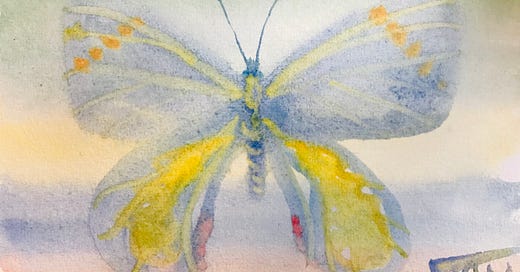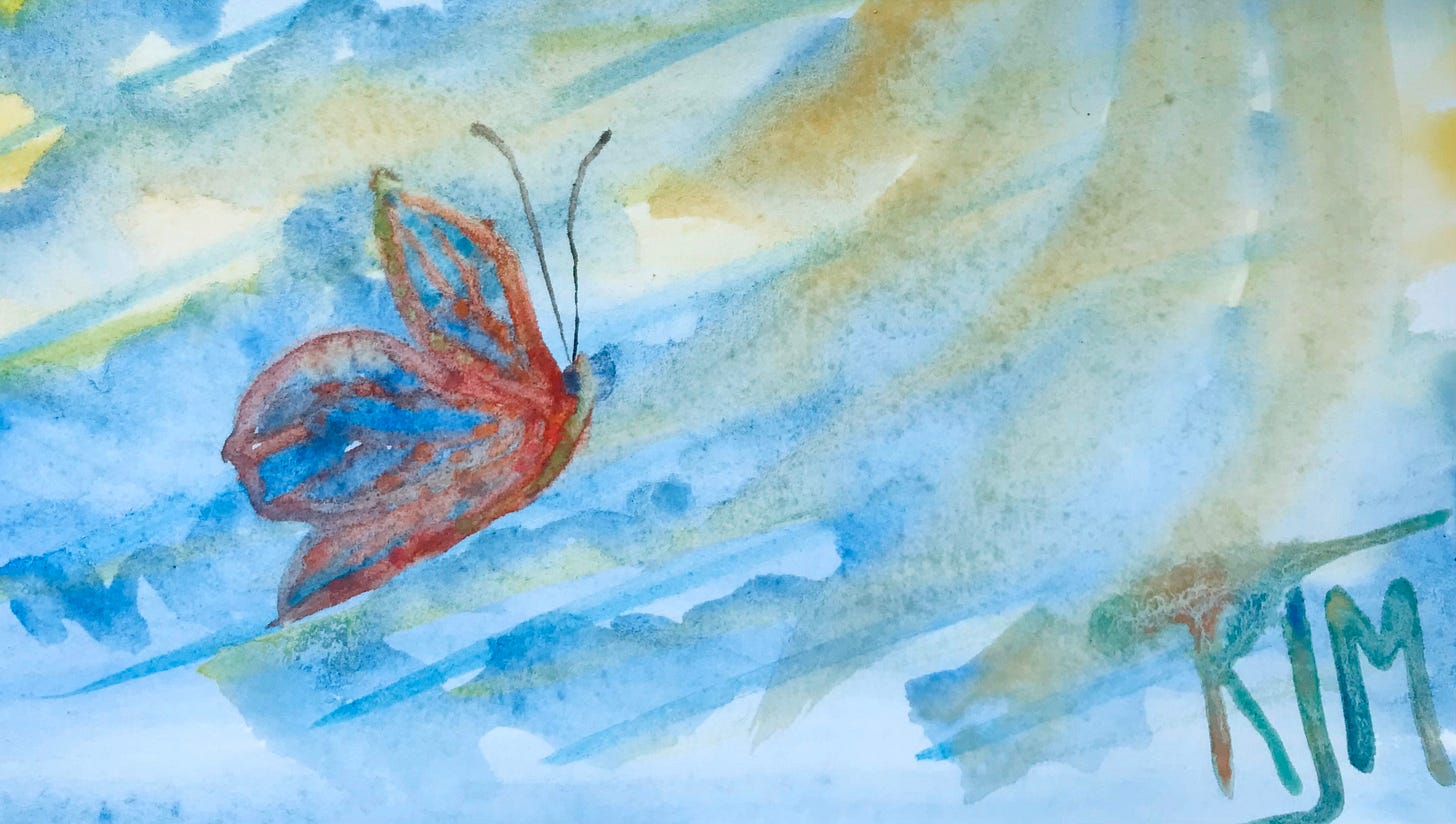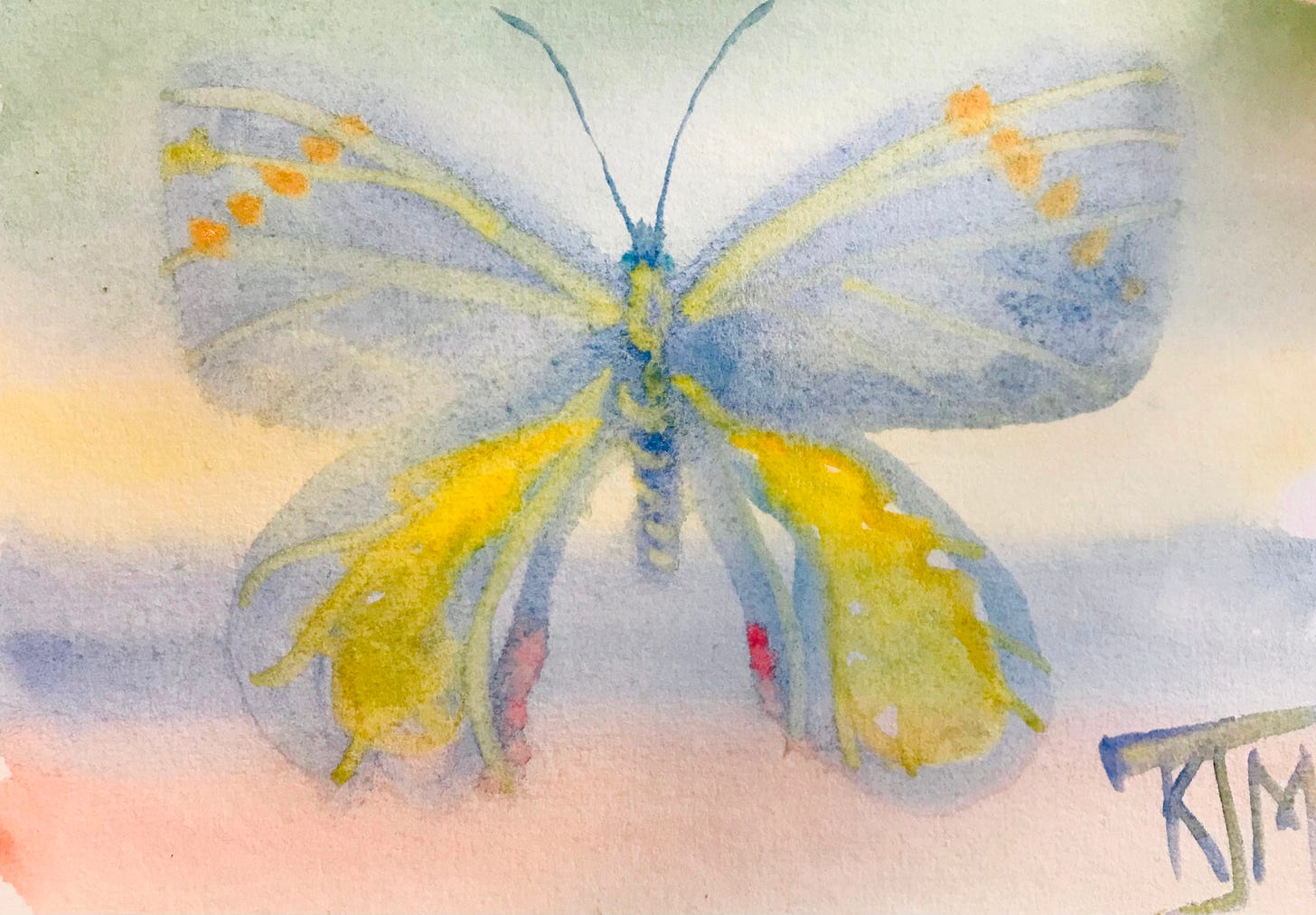I’ve been travelling this month, a journey with my rangatahi as they embark. For ages I thought rangatahi (a Māori word for young person) was spelled rangi-tahi — my own interpretation of this word was: child from the sky. Then I learned that the actual spelling of young-person in Māori is: rangatahi, which means youth, and also a fishing net about 20 metres long. Rangitahi means brief.
Lately, I’ve wondered: is trust something we can practice? Is it the fulcrum of the give-receive balance board? I don’t know, but as I’ve travelled north with my rangatahi, it’s been calming to think: whatever happens I trust myself to work out a way through; and, I trust my child. Further into the voyage, as I drew in my notebook: anchors on boats; and crew fixing the ferry ramp on the dock; wind crossing the swell — the drawings showed me: I trust. This insight came as a surprise to a cautious and self-reliant person who has cultivated a habit of, well, self-reliance. I have been, lately experimenting with practising trust: my car at the mechanics; turning-on-paid on Substack; talking openly about the-struggle-of-craft with writer-friends.
On the waterfront in Wellington, several rangatahi leapt and dived off a purpose-built structure into the harbour. Two of the women were superb divers, slicing into the water with clear skill. One of these women leapt again and again, while the other —after completing one successful dive, held back. The rangatahi continued to leap and fly, calling out to each other and laughing. All this time, the woman I had seen complete one exceptional dive, held back. Eventually, the others tired, and she quietly walked to the edge of the gang-plank. She held up her arms as I’d seen her do on that first dive, palms open, poised. Then she closed her palms, and her arms came down, she took a step back. Her hesitation rippled out, to her friends and to strangers like me, watching. She stepped up again, lifted her arms — again the hands closed, the arms fell, she stepped back. Several times she did this. Encouragement, an invisible field of it surged from the friends and strangers watching, along with another current curling back: knowledge that she might not try, she might give up. We watched and waited. She stepped up, back, several more times. I thought one of her friends might call her away so they could take a turn, but no one did. They waited. Again she stepped forward arms lifted, palms open, what was different this time? Nothing? Something? Trust? Defiance? Fear? Love? Desperation? Hope? Despair? All at once she dove, flipping in the air, slicing cleanly into the water below. The friends cheered, I cheered. Relief rippled out.
At my accommodation in Wellington, my host had this quote on her fridge:
“We leave something of ourselves behind when we leave a place, we stay there, even though we go away. And there are things in us that we can find again, only by going back there. We travel to ourselves when we go to a place where we have covered a stretch of our life, no matter how brief it may have been.”
¬ Pascal Mercier “Night Train to London.”
A few quick days passed, and it was soon time for me to leave Wellington, while my child from the sky remained in the city of winds.
A breeze whisked me into a high-ceiling cafe off Willis Street. I needed coffee and ordered a large americano with cream. Water was brought to me along with my order. I remembered I had my paints in my backpack, and hauled them out. The calligraphy brush had broken on the journey. I poured a little of the water into my painting jar, and held the pieces of the brush together.
I painted an Australian Orchard Butterfly, a kind I’d never seen before from a laminated travel-butterfly sheet my father-in-law gave me. Brown and gold in the picture, I painted my version blue with gold lines: for departure into life. As I painted, I understood: I needed to leave this butterfly on the table, and not know what will happen to it, or where it will go. I wanted to keep it, I liked this one. As I untangled myself from the idea of keeping-it, I thought about giving it to the toddler and parents sitting next to me; or maybe I should hand it to the kind person who brought water? But all of this felt too controlling, like trying to direct a path. Instead, I tore off a small piece of paper from the front of the pad and wrote, “Thank you for the water.” I tucked this note just under the painting, packed my things, and ducked out the door, walking quickly away, afraid suddenly someone would rush out calling, ‘You forgot something.’
No-one followed me. I will not know where the blue and gold creature may go, or not go.
The breeze whistled me around the corner and along Willis Street. Near my car, a shimmering-dark butterfly, one I have never seen before, fluttered past my face and hovered near me for moments. With you, it whispered in those milliseconds, neutrinos, particles — air.
*
I recently turned-on-paid on my Substack, after much wrestling with myself. I’m very grateful to, and humbled by my paid subscribers.
I’m equally grateful to my free subscribers for reading these words and allowing the gift to be simply attention and the exchange of ideas.
I always feel sad when I hit a paywall. And in a few moments there is a paywall, I hope it doesn’t make you feel too sad. Behind it are two things:
a tiny additional story about the painting accompanying this piece
a previously published poem from one of my collections
These are small (very small) extra offerings to paid subscribers, mainly to help me feel a sense of balance on the wobble-board of allowing-payment.
The main essay for A History of Kindness will always be free.
Thank you for reading.
Keep reading with a 7-day free trial
Subscribe to A History of Kindness to keep reading this post and get 7 days of free access to the full post archives.





